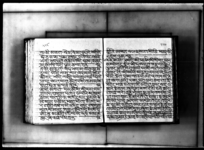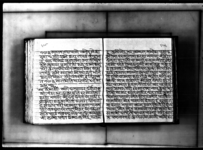Copy of a rukkā issued by the king to Prime Minister Jaṅga Bahādura Kũvara permitting jhārā labour to be used to build a bridge at Āryaghāta (VS 1903)
ID: RRC_0062_0180
Edited and
translated by Manik Bajracharya
in collaboration with
Pabitra Bajracharya
Created: ;
Last modified: 2019-08-07
For the metadata of the document, click here
The accompanying edition, translation/synopsis and/or commentary are available under the terms of the Creative Commons Attribution-ShareAlike 4.0 International License
Abstract
In the rukkā of which this document is a copy, the king permits the prime minister Jaṅga Bahādura Rāṇā to build a new bridge across the Bagmati River with jhārā labour.Diplomatic edition
[617]
1७४1रुक्कासौ–आगेश्रीप्राईममीनीष्टरयान2कम्याण्डरईनचीफजनरलजङ्गवहादुर
3कुव़रप्रतिमेरावावाकाजीवालनरसिंह
4कुव़रलेश्रीआर्याघाटमावनायाकोफला
5मकोपुलपक्कानठहर्दात्योफलामकोपु
6लअन्तसारीपक्कापुलवनाउनालाई
7मेरोरभाईहरूकाजीकर्णेलकपरदारक
8प्तानहरूकाषुवाकाप्रजारैतीहरूझारा
9लगाईवनाउनुभंन्याहुकुमवक्स्यापु
10लवनाउदाहुंभनितैलेहाम्राहजुरमा
11वीन्तीपार्दाधर्मकोकामहोतेरोरतेराभा
12ईकाजीकर्णेलकपरदारकप्तानहरुका
13तपसीलवमोजीमकाषुवाकाप्रजारैतीह
14रूलाईझाराकारुपैयातीर्न्यापुजारूलाई
15दप्कगुहाररझाराकारूपैयानतीर्न्यालाई
[618]
16१९०३सालमालाग्याकोअनेत्रकोझा
17रामाफगरीदप्कोझारालगाईजंगलवा
18टकाठवोकाईपुलवनाउनानीमीत्य
19ईनैषुवाकाप्रजारैतीहरुदप्कोझारा
20गरीपुलनसीधीनज्यालसम्मकाम
21लगाईयसैसालमासीध्याउनभनि
22झाराकोमोहरगरीवक्स्यौईतिसम्व
23त१९०३सालमीतिमाघवदी४रोज
24३सुभम्¯¯¯¯¯ ¯¯¯¯¯
Translation
[617]
741
Āge: To the Prime Minister and Commander-in-Chief General Jaṅga Bahādura Kũvara.
You have petitioned us as follows: "The iron bridge that my father KājīBāla Narasiṃha built at ŚrīĀryaghāṭa is deemed unstable. If, in order to shift the iron bridge elsewhere and build a [new,] stable bridge, [Your Majesty] were to issue an order to employ subjects (prajā) and tenants (raitī) of the provinces (khuvā) who are [under the authority] of me and my brothers—[holders of such posts as] kājī, colonel, kaparadāra and captain—as jhārā [labourers], I would build the bridge." I have thus issued [this] mohara [authorizing] jhārā that states: "It is an act of dharma [to build the bridge]. Employ subjects and tenants of the listed provinces that are [under the authority] of you and your brothers, who are [holders of such posts as] kājī, colonel, kaparadāra and captain. For subjects who are paid the jhārā fee, employ them by command (dapka/dapko) [or] request (guhāra), and for ones who are not paid the jhārā fee,
[618]
exempt them [first] from their jhārā obligations enforced for the year [VS] 1903 at other places and employ them [for the bridge construction] through jhārā by command. Have them carry timber from forest. Employ these subjects and tenants of the provinces until the bridge is complete within this year."Tuesday, the 4th of the dark fortnight of Māgha in the [Vikrama] era year 1903 (1847 CE). Auspiciousness.
Commentary
In pre-modern Nepal, unpaid, forced or compulsory labour was exacted in different forms by the government, land holders (birtāvāla) and government employees (jagiradāra). The Śāhās' campaign of expansion by war was conducted largely with the help of forced labour.2 It was also the basis for the growth of the hulāka system, which contained relays of porters along designated routes who carried military supplies and mail. The most common forms of such labour were jhārā, beṭha (or beṭhi) and begāra. The distinguishing features of these forms of labour are, however, vague. Jhārā is the term most widely used to denote unpaid or forced labour in general. Beṭha appears to derive from the Sanskrit term viṣṭi, meaning compulsory work. Begāra, for its part, comes from a Persian term meaning a forced labourer either under individuals or public service (Wilson 1855 s.v. begar). Rishikesh Shah indentifies beṭha and begāra as two forms of jhārā, beṭha being unpaid labour for farms and begāra being labour for purposes such as porterage, construction and digging (R. Shaha 1990/vol.1: 207). Mahesh C. Regmi, however, defines the terms differently: jhārā as the requisition of labour from each family for public purposes, beṭha as the exaction of unpaid labour on a customary basis, and begāra as the requisition of labour for emergencies (M.C. Regmi 1965: 53).
This document, an executive order of King Rājendra Vikrama Śāha, permits Prime Minister Jaṅga Bahādura Rāṇā to employ jhārā labourers in order to rebuild the bridge across the Bagmati River at Pashupati. Jaṅga Bahādura, the supremely powerful prime minister at the time, could have easily mobilized the labourers himself, so why did he have to obtain royal consent for a relatively minor task? S. Rupakheti opines that the reason lies in Jaṅga's inclination toward rule-based governance, uniformity and standardization (cf. Rupakheti 2017: 180). It is unclear, however, that there was standard legislation in place regarding jhārā labour at the time this document was issued. It is in the Mulukī Ain that declares that forced labour is to be exacted only for the state's purposes, and it was promulgated only in 1854, seven years after this document. The Mulukī Ain of 1854 contained four paragraphs regarding forced labour, which can be summarized as follows:
- A landlord is not to force a tenant or a peasant on his farm to work unpaid without a written contract. If such forced labour occurs, the landlord is to pay back a sum equivalent to wages of 10 paisās per day to the wronged party and to be fined an equal amount (MA-KM 54 11.1).
- A government official or a revenue functionary is not to employ forced labour for his own purposes. If it is proven that he has done so, the wronged party is to be reimbursed the equivalent of 4 ānās per day (MA-KM 54 11.2).
- Jhārā, begāra, and beṭhi are to be employed only for state-managed activities (MA-KM 54 11.3).
- If an official sends a person away from his own province as a day labourer or a porter, the latter should be provided with two meals a day and an allowance of 10 paisās per day (MA-KM 54 11.4).
The act of building the Bagmati bridge, even though of public concern, seems to have still been considered a private undertaking of the Kũvara family in this document. Interestingly, the king grants permission to employ the labourers on the grounds that the bridge building was "an act of dharma".
The document makes clear that not all the jhārā labourers were unpaid, and that the labourers could be employed either by command or by request.
The copier abbreviates the intitulatio down to the phrase rukkāsau, leaving out the name of the issuer. However, it is clear from the date that the issuer is King Rājendra (ruled until 12 May 1847). Since the word tapasīla is mentioned in the document, the original presumably contained a list of provinces that were under the control of the Kũvara brothers. However, such a list is not included in the copy.


